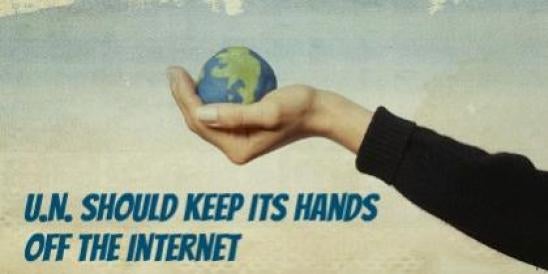In March 2012, a resolution was introduced in the U.S. House of Representatives that would urge the U.S. Permanent Representative to the United Nations to oppose any resolution that would regulate the Internet. It is unfortunate that it turns out to be necessary to forestall Internet regulation at the U.N. level, but that appears to be the case. We support this resolution.
The resolution, House Concurrent Resolution 114, was introduced by Rep. Michael McCaul (R-Tex.) and Rep. Jim Langevin (D-R.I.), co-chairs of the House Cybersecurity Caucus, in response to growing fears that some nations will seek to regulate and censor the Internet. The sponsors cited a September letter from China, Tajikistan, Russia, and Uzbekistan outlining their plan to introduce a United Nations resolution on Internet governance.
Rep. Langevin said in a statement, “The proposals by some nations to gain international approval of policies that could result in Internet censorship would be a significant setback for anyone who believes free expression is a universal right. It must be made clear that efforts to secure the Internet against malicious hacking do not need to interfere with this freedom and the United States will oppose any attempt to blur the line between the two.”
The resolution was referred to the House Committee on Foreign Affairs on March 26, 2012, and no action has occurred on it since then.
Internet freedom has been a hotly debated issue on Capitol Hill in recent months with the Senate’s Protection of Intellectual Property Act (PIPA) and the House’s Stop Online Privacy Act (SOPA) becoming the focus of protests that eventually helped defeat the bills.
The Issue of Internet privacy will soon be dealt with at the international level. The World Conference on International Telecommunications (WCIT) is scheduled for December 2012, and countries such as China and Russia are expected to try to expand the authority of the International Telecommunications Union (ITU). The ITU is the United Nations agency that is responsible for worldwide standards in telecommunications, including regulation of the Internet.
The proposals that are expected to be considered could dramatically affect the Internet. Russian Prime Minister Vladimir Putin said last June that his goal is to establish “international control over the Internet” through the ITU. Accordingly, it’s understandable that many Americans fear that other nations could employ a new regulatory scheme to censor the Internet and control access to information. One reason that some of the protesters were so strongly opposed to SOPA and PIPA was the fear that once tools exist for regulating Internet content, they can be prone to abuse.
Internet access improves the quality of life for people across the world and represents a triumph of freedom of expression. Any agreement like the ones expected to be sought at the WCIT could have dramatic chilling effects on the freedom of the Internet. We will keep you up to date on any movement in Congress or in the United Nations regarding Internet freedom.



 i
i


